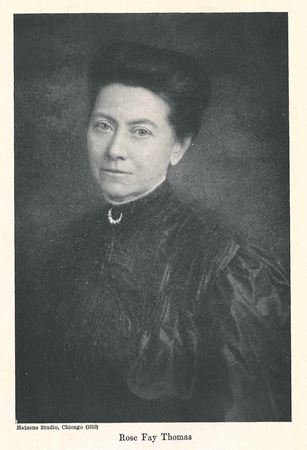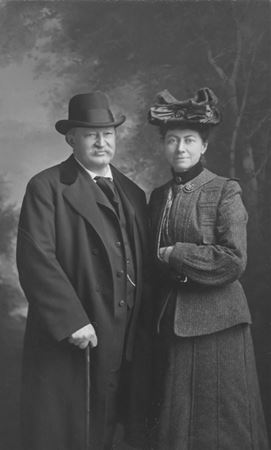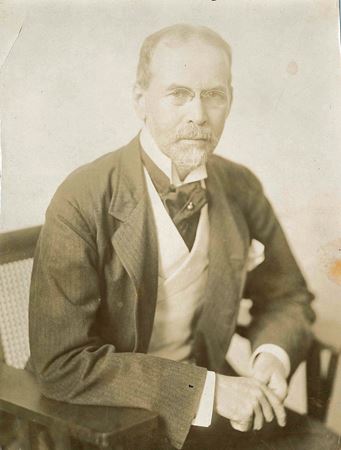Southern Illinois University Press
Described as "a real-life Little Women," Sisters of Influence is the untold story of three extraordinary sisters who defied Victorian-era expectations to leave their marks on history. Author Andrea Friederici Ross has brought new life to the fascinating stories of Zina, Amy and Rose Fay, intertwining their narratives into a captivating family biography.
One of the sisters is Rose Fay Thomas who, as the wife of the Chicago Orchestra’s founder and first music director Theodore Thomas, played a pivotal role in establishing the ensemble, and her later writings on gardening and her husband’s life further solidified her legacy. Initially a quiet supporter of her sisters, she emerged as a formidable force in her own right, becoming a founder and first president of the Anti-Cruelty Society. Rose’s leadership in Chicago’s Amateur Musical Club and the National Federation of Music Clubs helped shape the American classical music scene.
Frank Villella, director of the CSOA’s Rosenthal Archives, sat down with the author to talk about the new book.
Frank Villella: How did you first learn about the Fay sisters and what drew you to their stories?
Andrea Friederici Ross: I’ve done volunteer work in animal rescue, so I first came across Rose Fay Thomas and her role in founding the Anti-Cruelty Society. When I realized she was married to Theodore Thomas, the founder and first music director of the Chicago Symphony Orchestra, I was intrigued by the juxtaposition of the elegance of classical music with the grit of animal rescue. She seemed a woman of real substance. The further I dug, the more true that became. Once I came across her remarkable sisters, there was no turning back!
What is your connection to the Chicago Symphony Orchestra?
Several decades ago, I was the operations manager of the CSO. My biggest challenge was coordinating the logistics for the 1990 tour to Russia under Sir Georg Solti, during his final season as eighth music director. And my husband, Jim Ross, retired last year after 45 years in the CSO percussion section.
When preparing to write the book, where did your research take you?
I started out writing a solo biography of Rose. But, after finding a treasure trove of family correspondence at the Schlesinger Library in Cambridge, Massachusetts, it became clear that Rose had powerhouse sisters that couldn’t be ignored. Her eldest sister, Zina, became a leader in women’s reform, particularly in terms of domestic housekeeping and in advocating for higher education for women. Middle sister Amy was a talented pianist who studied with leading musicians of the day, including Franz Liszt. All three sisters were involved in music education and in creating more opportunities for women in music.







What was one of the most unexpected things you learned about Rose Fay and her sisters?
These were not daughters of privilege. Their father, Charles, was an Episcopalian reverend and they lived in pretty poor circumstances as young children. But the family believed in education, which offered them access to some fascinating individuals. Rose ended up in a school in Henry Wadsworth Longfellow’s home and Zina married into a prominent Harvard family. These social connections enabled the siblings to steadily improve their circumstances and, ultimately, enact change in their communities.
What do you hope readers will take away from reading your book?
Charles Norman Fay, the sisters’ sole brother, is often credited for establishing the CSO. He created an organizational structure and rallied his fellow Chicago businessmen to secure the initial funding. But I believe Rose’s relationship with Theodore was crucial as well. Without this new partnership and warmly embracing family, Thomas likely would not have relocated from New York and started anew. Surely, Chicago would have eventually founded a resident orchestra, but it was thanks to the Fay family that they were able to entice Thomas (then considered the nation’s most prominent conductor) to head it up. Theodore Thomas, with his unique talent for programming and a powerful drive for perfection, shaped the institution we know today.
If you could sit down with Rose Fay and her sisters, what would you ask them?
I’m certain they would all be pleased to see so many female musicians in the Orchestra! But I’d love to ask them where do we go from here? The role of women in society continues to evolve. Gender inequality still has a long way to go, particularly in terms of health issues and pay equity.
What’s next for you? Who might you write about next?
I love finding forgotten women of Chicago and bringing their stories to life. There’s no shortage of good stories out there!
Andrea Friederici Ross is the author of Edith: The Rogue Rockefeller McCormick and Let the Lions Roar! The Evolution of Brookfield Zoo. She has worked as the operations manager for the Chicago Symphony Orchestra, assistant to the director of the Chicago Zoological Society and at her local public school library.
A Biography of Zina, Amy and Rose Fay
A real-life Little Women, Sisters of Influence is the untold story of three extraordinary sisters who defied Victorian-era expectations to leave their marks on history.



